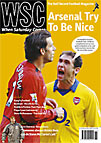 Harry Pearson reads two new books about David Beckham and is none the wiser about anything – except that there is nothing about Beckham to become wiser about
Harry Pearson reads two new books about David Beckham and is none the wiser about anything – except that there is nothing about Beckham to become wiser about
What can you say about David Beckham that hasn’t been said already? Well, OK then, apart from that he is an ugly waster with a great left foot and a string of failed relationships? Ever since Gazza imploded and Becks began to replace Ryan Giggs as the football cover boy of choice, we have been bombarded not so much with information about the midfielder as interpretations of him. Who Beckham is has been submerged under what he means.
Whether Beckham’s move to Real Madrid has been a good deal for the Spaniards or a shrewd one for Manchester United remains to be seen. One thing is certain, though, the whole thing has been great news for all those beavering away eagerly in the cultural commentary business – and God knows, now that all the call centres are moving to India, it sometimes seems this may soon be Britain’s only growth industry. Since the transfer was announced, our TV screens seem to have been filled almost daily by the sort of academics who use the word paradigm and icon more than is decent and will witter on about the semiotic significance of the Alice band in return for a couple of hundred quid and the chance to pose about in a minimalist hotel room looking like someone who once played session keyboards with the Eurythmics.
A personal feeling is that this is all an even bigger waste of the English language than it looks. Because like a post-modern Captain Scarlet, David Beckham is indeconstructable (oh bollocks, it’s contagious). Bluntly, the man has no subtext. Though we are variously told that he is a 21st century Elvis, a male Princess Diana, a footballing Madonna, in the end the person Beckham most resembles is Chance the gardener in the film Being There. And that is surely part of his fascination for the cult-com crowd. Beckham is a blank canvas onto which they can project whatever rubbish pops into their heads after a couple of pages of Baudrillard and a moccacino grande.
Before me I have the two latest pieces of Beckhamiana. I think it is fair to say that neither of them add much to what we already know about the man. Which, since one of them is his autobiography, is, as David Beckham himself might say, “pretty amazing”.
Veteran football writer Jason Tomas’s work is a neat and clear précis of the relationship between Ferguson and Beckham that weighs in at a slender 30,000 words or so and will be handy for anybody who has been in a coma for the past five years and is eager to get up to speed on the important topics of the day. Tomas is even-handed in his telling, his style is happily free from cliche and if there is nothing much fresh here it is at least always nice to be reminded that Manchester United’s chief of security is called Ned Kelly.
Beckham’s own book is probably best summed up in the little “personal message” on the inside of the front cover. “Hope you enjoy the book,” it says and underneath is DB’s signature. The lower belly of the letter B, looping downward, encircles the number 7 and is flanked by a couple of “xx” kisses. In the pages of My Side, Beckham tells us how he spent hour after hour practising his free-kicks, but I imagine he expended almost as much time on perfecting this signature. Sadly, scholars have yet to ferret out his school notebooks, but my bet is that when they do we will find them covered with prototypes. The message, like the text that follows, is a bit obvious, a trifle over-rehearsed, slightly irritating, but overall really quite sweet.
Beckham’s favourite adjective after “amazing” is “unbelievable” and he spends much of the book being astonished or awed by the things he sees and the people he meets. His insouciance seems genuine enough, as does his love for his much maligned wife. Throughout My Side Becks expresses loyalty, admiration and devotion to Posh that in its intensity in the face of public disapprobation can’t help but recall John Lennon’s for Yoko or Paul McCartney’s for Linda. (Surely there’s a thesis in that for somebody?)
At the end of it – and to be frank at 400 pages it’s a long haul, a bit like sitting through a kindly next door neighbour’s box of holiday slides – you are left with the feeling that Beckham is exactly what he seems – a decent, essentially ordinary man, who loves his family and his work. In the world of Ben ’n’ Jen, this is certainly refreshing, uplifting even, but it doesn’t actually signify anything. In Beckham’s case – and I mean this in the nicest possible way because I think he is, all things considered, an admirable fellow – still waters run shallow. What those who gaze into them see is not an insight into the nature of masculinity in the early years of the new millennium, or a designer-label parable of sin and redemption, but simply a reflection of their own prejudices and verbal incontinence. Now come on TV producers, surely that’s worth £250 and a five-minute slot on the next Beckumentary?
From WSC 201 November 2003. What was happening this month